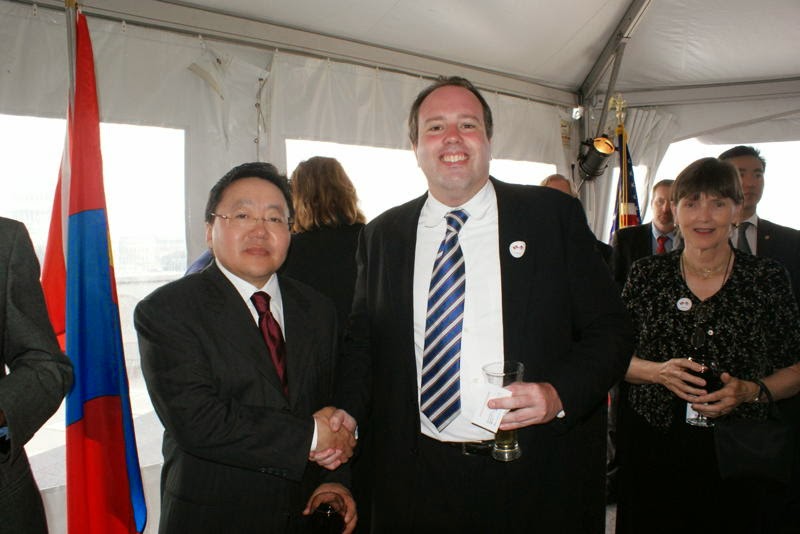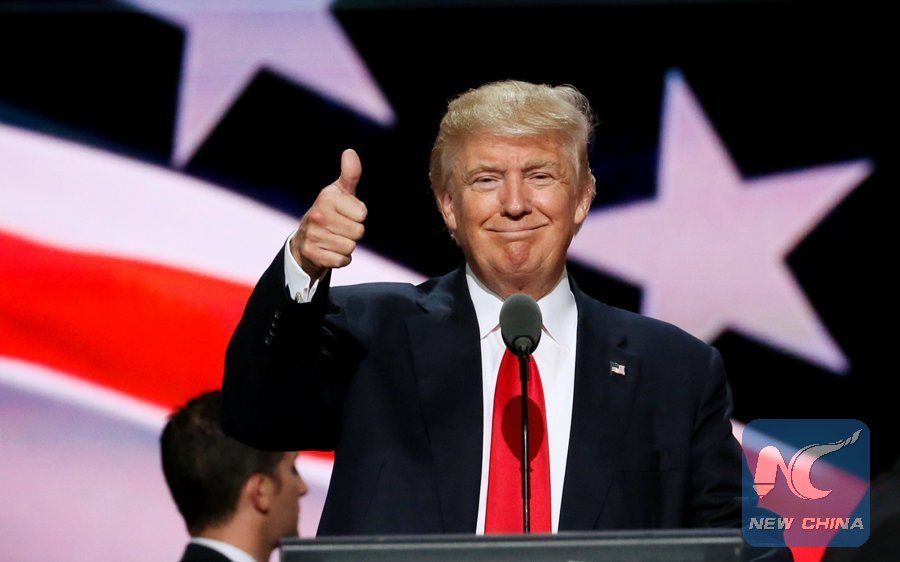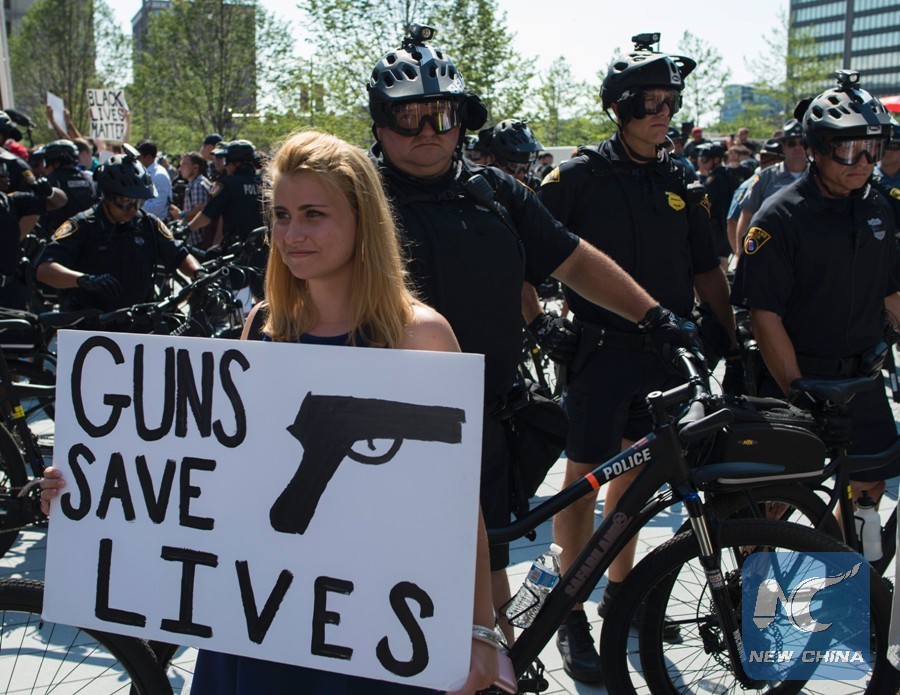Ralph Winnie Jr. with the Mongolian President

Blog Archive
Thursday, July 28, 2016
Thursday, July 21, 2016
Ralph Winnie, Jr. quoted in Xinhua News at Republican National Convention in Cleveland, Ohio
Analysis: Trump likely to cover economy, security in nomination acceptance speech
Republican presidential nominee Donald Trump gives a thumbs up during his walk through at the Republican National Convention in Cleveland, U.S., July 21, 2016. REUTERS/Rick Wilking
Republican presidential nominee Donald Trump gives a thumbs up during his walk through at the Republican National Convention in Cleveland, U.S., July 21, 2016. REUTERS/Rick Wilking
by Matthew Rusling
WASHINGTON,
July 21 (Xinhua) -- U.S. Republican presidential nominee Donald Trump,
who will take the stage Thursday night to accept his nomination, is
expected to speak both about the nation's sluggish economy and
international threats.
"You'll
see references to foreign policy and domestic policy, focusing on
cutting taxes and growing the economy. And he'll talk about the ability
to invoke common sense practical solutions to problems," Ralph Winnie,
an alternate delegate for the state of Hawaii, told Xinhua in a phone
interview from the Republican National Convention in Cleveland, Ohio..
Trump
will focus on rebuilding the country after eight years of U.S.
President Barack Obama, Winnie said, referring to the world's largest
economy which has still not fully recovered from the downturn since
2008.
While
the unemployment rate is just below 5 percent, economists note that the
number does not measure the true health of the U.S. economy and the job
market, as millions of Americans have simply given up looking for work
out of sheer frustration.
Trump
is also likely to speak about the threat of radical Islam worldwide, as
the last month has seen terror attacks worldwide, perpetrated by the
terror group Islamic State (IS) or those who have been influenced by the
extremist group.
Indeed,
while IS is on the defensive in its strongholds in the Middle East amid
a U.S.-led bombardment, the Islamist radicals have taken their war
outside their area of control. The group has carried out deadly terror
strikes in Turkey, the United States, France and Belgium in just the
last few months, in a bid to prove to the world that it is still
relevant.
Critics
have slammed the Obama administration for what they say is no real plan
to keep the U.S. safe, especially after a recent attack on a gay night
club in Orlando, Florida carried out by a gunman who swore allegiance to
IS. The attack ended in the death of 49 people.
"(Trump)
also believes that we are in a war with radical Islamic terrorists, and
this has to be combated. So it's likely that something along those
lines will be said in his acceptance speech," Winnie said.
Recent
weeks have also seen attacks on police by perpetrators who ambushed
officers and assassinated eight officers in the cities of Dallas, Texas
and Baton Rouge, Louisiana amid rising tensions between police and
blacks.
Winnie said Trump will likely highlight support for law enforcement in light of recent events.
Much is riding on Trump's speech, which will be broadcast nationwide to an audience of millions.
Experts
said the brash billionaire will need to convince viewers who are on the
fence that he can act in a way fitting of a president, as critics have
blasted him for what they say is being hot headed and bombastic.
Viewers will want to see a candidate they can picture in the White House - someone who is calm and cool under pressure.
Moreover,
analysts say that Trump needs to unify the divided Republican Party and
needs to get over 90 percent of rank-and-file Republican voters to cast
their ballots for him on election day in November.
Many
establishment Republicans and evangelicals are said to be on the fence
over whether to vote for Trump or not, and much of their decision may
ride on Trump's performance Thursday night.
Wednesday, July 20, 2016
Ralph Winnie, Jr. quoted in Xinhua News at Republican National Convention in Cleveland, Ohio
Analysis: Trump to voice support for police at Republican convention
A gun rights activist stands in front of police lines during a rally outside the Republican National Convention in Cleveland, Ohio on July 19, 2016. / AFP PHOTO / Andrew CABALLERO-REYNOLDS
A gun rights activist stands in front of police lines during a rally outside the Republican National Convention in Cleveland, Ohio on July 19, 2016. / AFP PHOTO / Andrew CABALLERO-REYNOLDS
by Matthew Rusling
WASHINGTON,
July 20 (Xinhua) -- U.S. Republican presidential nominee Donald Trump
is expected to voice support for police during this week's Republican
National Convention (RNC), at a time of growing anti-police sentiment
amid rising racial tensions.
"The
police are obviously very concerned, because they don't feel that
anyone has their back," Ralph Winnie, an alternate delegate for the
state of Hawaii, told Xinhua in a phone interview from the RNC held in
Cleveland, Ohio.
"So they are very wary about taking the risks that are necessary to go after and combat violent crime," Winnie said.
The
RNC was overshadowed by rising racial tensions and violence in the past
two weeks, which witnessed two incidents in which eight police officers
were killed and a dozen others wounded by two black gunmen in the
states of Louisiana and Texas.
The
two police killing incidents were preceded by two shootings in which
two black men were killed by police in Louisiana and Minnesota.
The killings sparked angry black protests nationwide, calling for justice for the African Americans in the country.
Winnie
noted the RNC opened with a moment of silence for the officers who were
ambushed and slain in Dallas, Texas and Baton Rouge, Louisiana.
"Trump
has been very vocal in saying he's going to stand with the police
officers, and not stand with groups like Black Lives Matter as well as
some of the radical groups that are really creating havoc," Winnie said.
The
black rights advocate group, Black Lives Matter, has staged anti-police
protests in multiple U.S. cities in a bid to demonstrate against the
recent killings of black men by police officers, who are usually white.
"And so it's very important that Trump sends the message that his administration stands behind law enforcement," Winnie said.
When
asked what specifically Trump plans to do to combat anti-police
violence, Winnie said a Trump White House would make sure police have
the money and resources to be able to combat violent crime at a
dangerous time.
Moreover,
the Justice Department would also support officers, at a time when the
administration of U.S. President Barack Obama has been blasted for what
critics call "not standing behind the police."
Critics
say Obama and the Justice Department are quick to wade in anytime a
black man is killed by police, even before all the facts are straight.
For
example, an unarmed black man, Michael Brown, was shot dead in
Ferguson, Missouri in 2014 after he attacked a police officer.
Riots erupted in Brown's hometown, though later the Justice Department cleared the officer of any wrongdoing.
Both
Obama and former Justice Department chief Eric Holder were accused by
many of jumping to conclusions before all the facts were straight.
Obama
was slammed when he sent some of his aides to Brown's funeral.
Nearly a year later, Howard Safir, former New York City police
commissioner, said Holder "had a war on police."
"Under a Trump presidency, the Justice Department would certainly be willing to back up the police officers," Winnie said.
Critics
of U.S. law enforcement, however, believe that young black men are
often the victims of police bias due to racial profiling. Stories abound
of innocent blacks being pulled over or questioned by officers for no
apparent reason.
A
Gallup poll released last week showed that American blacks are split on
whether they believe the police act unfairly toward them. [ It found
that half of blacks believe police in their local areas treat blacks and
other racial minorities fairly, while 48 percent said they treat blacks
unfairly.
While
Trump has on numerous occasions expressed support for the police,
critics say the bombastic businessman often makes grandiose statements
without providing details on how to turn his ideas into reality.
However,
Trump's message of supporting police could further alienate African
American voters among whom he is already suffering from a bad image
problem.
A recent poll found that Trump has nearly zero support among black voters in the crucial states of Ohio and Pennsylvania.
Subscribe to:
Posts (Atom)

